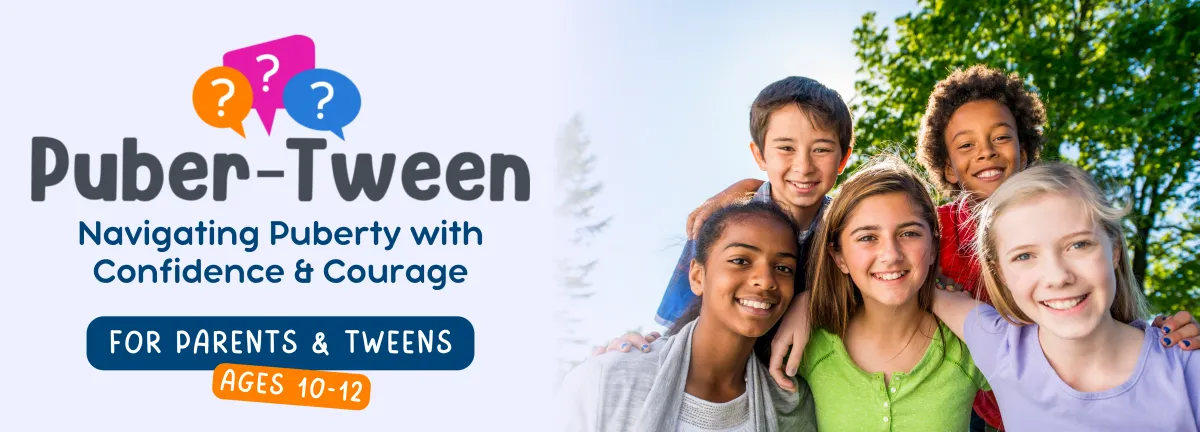
Gender-Specific Classes for Comfort & Connection

Puber-Tween is a comprehensive 2½ hour class is specifically designed for older tweens who haven't yet taken formal puberty education.
If your child is already experiencing changes or feeling confused about what's happening to their body, Puber-Tween provides the perfect foundation.

👩🏫 Why Choose This Puberty Class for YOUR Tweens?
Rather than leaving tweens to figure things out on their own or get information from unreliable sources, Puber-Tween creates a safe, interactive environment where they can learn alongside their parent. We replace confusion and embarrassment with understanding and normalcy.
💜 Parent-Child Puberty Education Works, AND WE VALUE STRENGTHENING YOUR FAMILIES CONNECTION.
This isn't just an educational class—it's a bonding experience. By learning together, you and your tween develop a shared vocabulary and comfort level around these important topics. Many families tell us this class becomes the foundation for open communication throughout the teenage years.

📋 What’s Covered in This Puberty Education Class?
For All Tweens:
Physical and emotional changes during puberty
How hormones affect their body and mood
The role of genetics in their development
Nutrition needs for growing bodies
Age-appropriate reproductive anatomy education
Girls' Class Bonus:
Comprehensive period preparation and what to expect
Hands-on creation of a personal puberty kit to take home
Practical tips for managing menstruation with confidence
💪WHAT MAKES PUBER-TWEEN DIFFERENT
THAN OTHER PUBERTY CLASSES?
FOR YOUR TWEEN (AGES 10-12):
Medically accurate information from a trusted source
Understanding that their changes are normal
Understanding that their changes are expected
Confidence to ask questions without embarrassment
Practical tools for managing puberty
FOR YOU, AS THEIR PARENT:
Increased confidence in discussing puberty topics
Better understanding of what your child is experiencing
Tools and language for ongoing conversations
Peace of mind knowing they have accurate information


💪 THE LONG-TERM IMPACT OF PUBERTY CLASSES
Puber-Tween sets the stage for your child to come to YOU with questions and concerns rather than turning to friends, the internet, or simply worrying in silence.
When tweens understand their bodies and feel supported by their parents, they navigate adolescence with greater confidence and less anxiety.

Navigating Puberty with Confidence & Courage
Two-Ways to Join a Class
Classes are hosted in a private home or other location of your choice, with parents on couches and kids on the floor right next to their parents.
Join our Birds & Bees email list to be the first to know when our popular Open to the Public classes are announced. Classes run year round and the group size is between 8-12 families per class.
Your tween's puberty journey is going to happen whether you're prepared or not.
The question is: will you guide it, or will you scramble to keep up?
Frequently Asked Questions
When will my son or daughter start puberty—and how will I know it’s beginning?
Puberty hits boys anywhere between 9 and 15. Everyone grows at their own pace, and being early or late doesn’t mean something’s wrong. Some guys shoot up fast, others take their time. Height is usually determined by genetics.
Puberty hits girls usually between 8 and 13. One of the first signs? Tiny breast buds (they may look like mosquito bites). You might also notice body odor, emotional ups and downs, or hair where there wasn’t hair before. Totally normal.
When should I start talking to tweens about puberty and hygiene?
Sooner than most parents think. The goal is to have lots of small, casual conversations—not one big awkward “talk.” Start early (even around age 8) and build from there.
What’s the emotional impact of puberty—and how do I support my tween?
Listen without judgment. Be calm when he's not. And remind him (gently) that what he's feeling is okay—and temporary.
Puberty is messy, awkward, and confusing… but it’s also a huge part of becoming you. Ask questions. Stay curious.
Need help understanding if this class if correct for you?

Copyright © 2025 Leslie Dixon
🐝 Contact Leslie
(949) 394-1556
leslie@leslie-dixon.com
Cancellation Policy:
We require a minimum of 48 hours notice if you cannot attend a scheduled class.
Refunds are not offered. If you do cancel within the notice period, you will receive a class credit that can be applied towards a future class, including hosting a class or an Open to the Public class.
